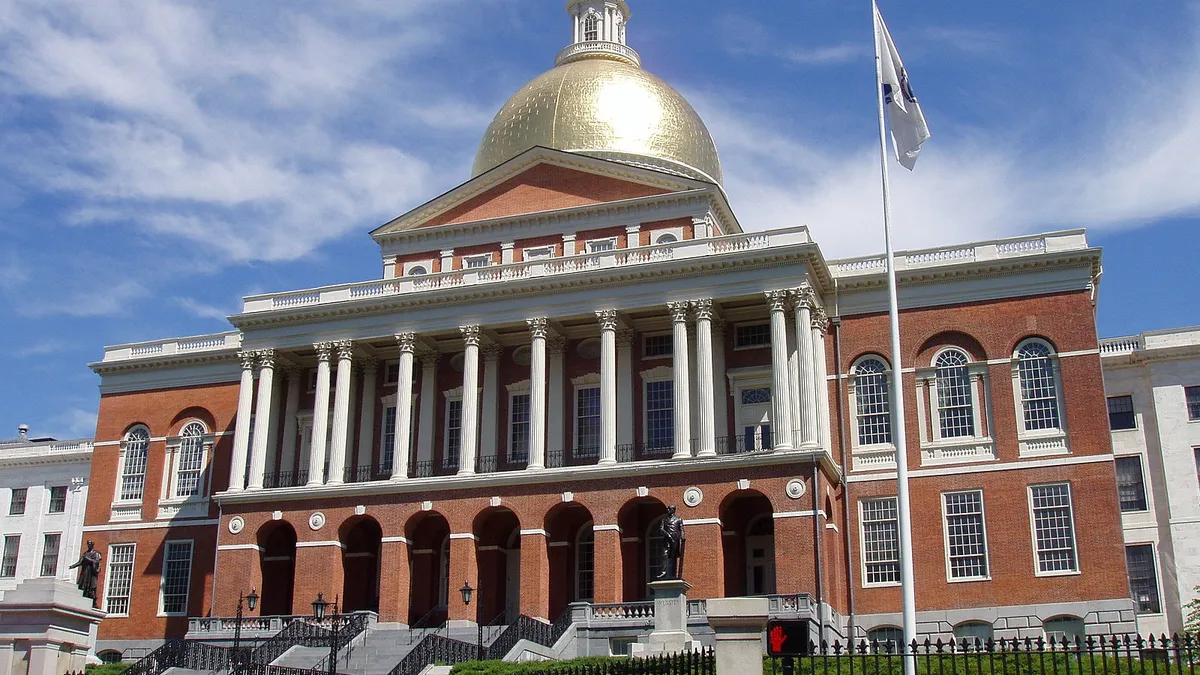UPDATE: August 6, 2020: Massachusetts announced the launch of its Clean Peak Energy Standard on Tuesday, the state's Department of Energy Resources said in a press release. The department, along with the Massachusetts Clean Energy Center (Mass CEC), is planning to hold a stakeholder informational session on Aug. 10. In addition, an application portal for the program, to be managed by MassCEC, will go live on Aug. 17.
Dive Brief:
- Massachusetts has finalized regulations to implement the nation's first Clean Peak Energy Standard (CPES), a mechanism designed to provide incentives to clean energy technologies that can supply electricity or reduce demand during seasonal peak demand periods.
- The administration of Republican Gov. Charlie Baker filed the regulations on March 20 with the state legislature's Joint Committee on Telecommunications, Utilities and Energy (TUE) to begin a formal review process. The CPES application portal is scheduled to go live in July, to allow participants to submit their resources to qualify for clean peak certifications.
- Massachusetts lawmakers authorized the program in 2018. The first CPES certificates will be generated in January 2021.
Dive Insight:
There is still a multi-step review process ahead for Massachusetts' Clean Peak program, but officials say they are on track to launch this summer. While the new standard is expected to reduce ratepayer costs from avoided or deferred infrastructure upgrades, utilities remain concerned about the cost of the program.
Though the law requires ratepayer costs to be capped at $0.005/kWh, National Grid and Unitil in October filed joint comments with the Massachusetts Department of Energy Resources (DOER), arguing that while the cap "may appear to be a small amount, in fact, it could be quite substantial."
National Grid sees impacts of the new standard beginning small, but ramping up over the next decade to cost the average customer about $40 annually.
The utility will need to procure the new clean peak certificates against its basic service, and believes it will need to run procurements for long-term contract purchases of the certificates for a portion of its demand.
Despite concerns, National Grid generally supports the CPES concept — though it filed comments with a number of suggested improvements to the program. Those recommendations were not adopted.
The new clean peak standard "represents another major step forward" for Massachusetts' aggressive climate goals, DOER spokesman Eric Noreen said in a statement. The finalized regulations position the state "to realize deeper emissions reductions, provide savings to ratepayers, increase the resiliency of the electrical grid, and meet the challenges posed by climate change."
Including ratepayer savings from avoided or deferred infrastructure upgrades, DOER estimates the standard will provide overall net savings within five years and save approximately $400 million in the first decade.
Baker's administration has set a goal for Massachusetts to reach net-zero greenhouse gas emissions by 2050. According to DOER's analysis, the CPES will reduce carbon emissions by 560,000 metric tons in the first ten years in addition to the emissions reductions provided by new and existing renewable energy resources.
Resources eligible for CPES certificates include: new renewables; existing renewables that pair with new energy storage; new energy storage that charges primarily from renewables; and demand response resources.
The certificates could be sold to retail electricity suppliers, which would be required to purchase a certain amount each year to meet the CPES minimum obligation, beginning at 1.5% this year. Alternatively, utilities can meet the obligation by making an alternative compliance payment.
The CPES "is an important step towards making the grid more resilient, efficient, sustainable and affordable," the Energy Storage Association (ESA) said in a statement. Along with carbon reductions, the group expects the program to reduce infrastructure costs for ratepayers by $710 million over the next decade.
"The finalized regulations announced by DOER are an encouraging basis for energy storage companies to invest further in Massachusetts," ESA said.
Friday's filing launches an initial 30-day review period, during which TUE may provide comments to the Massachusetts Department of Energy Resources (DOER). After the initial review, DOER will assess comments and re-file the regulations with the committee, launching a second 30-day review period.
DOER will then file the CPES regulations with the Massachusetts Secretary of State to be published following a two-week review.
While Massachusetts' new standard would be the nation's first, it is not the only state to consider the approach. The Arizona Corporation Commission is also considering a CPS as part of a revision to its energy rules, according to Jason Burwen, ESA's vice president of policy.















